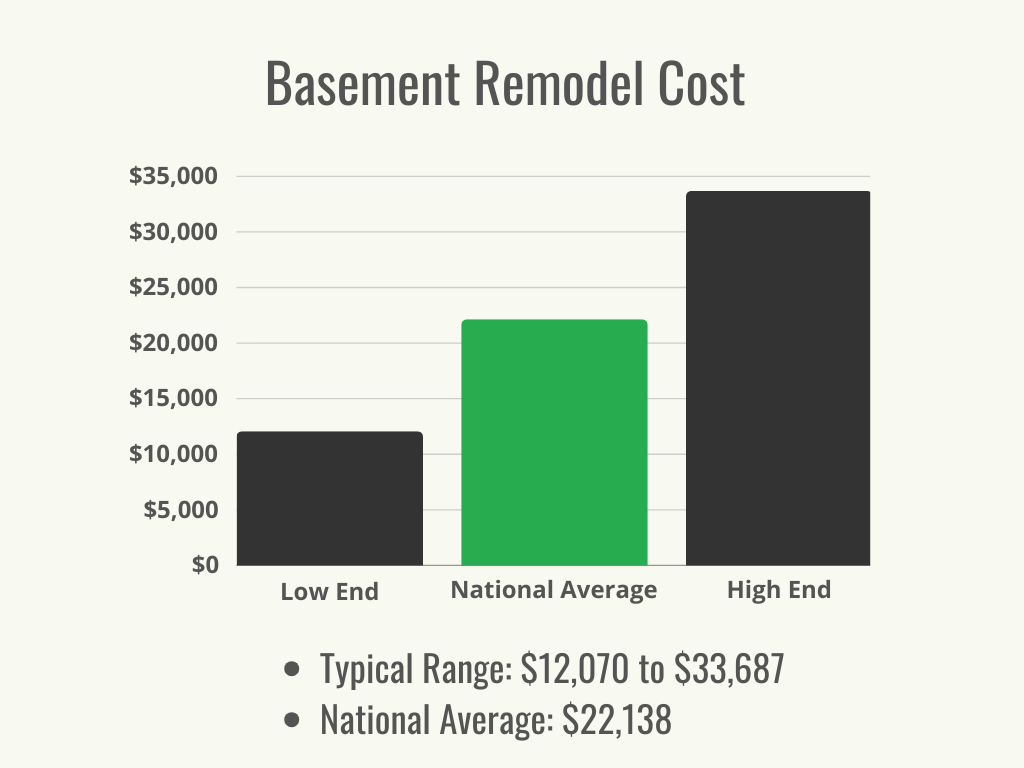

We may earn revenue from the products available on this page and participate in affiliate programs. Learn More ›
Highlights
- The typical range for basement remodel costs is $12,070 to $33,687 with a national average of $22,138.
- The most significant cost factors for basement remodeling can include basement size and condition, project type, addition type, labor, and permits.
- Some of the benefits of basement remodeling are return on investment, additional versatile space, energy efficiency, mold prevention, and income potential.
- It’s a good idea to hire a contractor to manage basement remodeling projects, and any electrical or plumbing work will need to be handled by licensed professionals.
With the high cost of new construction, homeowners may look to their basements for additional living space. While the average cost of basement remodeling is about $22,138 nationwide according to Angi, that figure varies widely depending on the quality of the materials used and the type of remodeling.
Still, finishing a basement is often a much more affordable way of expanding a home’s living space than building a new addition to the house because the floors and walls are already in place. While some basement remodeling projects are in the DIY realm, many require the services of licensed contractors, and the final basement remodel cost will typically range from $12,070 to $33,687.
Basement Remodel vs. Basement Renovation
Many use the words “remodel” and “renovate” interchangeably, but there is actually an important distinction between the two. Remodeling typically involves changing the space’s layout or changing the purpose of the space. Remodeling often describes a total basement makeover and is relatively costly compared with a renovation. For example, it may include installing a kitchen in the basement or adding walls to create extra rooms.
By contrast, renovating doesn’t change the space’s purpose; it usually makes something old feel new again with updates. This means basement renovation costs are typically lower than basement remodel costs. Renovation is a lighter and less costly type of update with more cosmetic changes than structural ones. For example, renovating an already-finished basement might look like painting the walls, replacing old flooring, or hanging new doors. When speaking with contractors, homeowners will want to be clear on whether they are planning a renovation vs. a remodel to make sure everyone is on the same page.
Factors in Calculating Basement Remodel Cost
The average cost of a basement remodel can vary depending on whether a homeowner has small basement remodel ideas or is transforming a very large space. Other factors lie in the unique properties of basements, their current condition, and the going rate of labor in the community.
Basement Size and Condition
Two of the main factors determining the cost of a basement remodel are the basement’s size and current condition. A partial basement remodel of an area less than 700 square feet could run from $9,000 to $52,500, while the complete remodel of a basement with 4,000 square feet could top out around $300,000. Basements that are not finished will be more costly to remodel. If there are any issues with water seeping through the basement floor or walls, it will cost more to remodel since waterproofing will need to be done first and could run $5 to $10 per square foot.
| Basement Size | Cost Range |
| Small | $9,000 to $52,500 |
| Medium | $21,000 to $112,500 |
| Large | $45,000 to $150,000 |
| Extra-large | $60,000 to $300,000 |
Project Type
Depending on the extent to which the basement has already been finished, there may be costs associated with making the space comfortable and safe to spend time in. Basement finishing costs will add $2,800 to $34,500 to the project budget. For example, finishing basement walls includes adding framing, insulation, and drywall. If plumbing and electrical have not already been run to the space, this will also come with an additional cost. Other considerations include installing flooring and egress windows, mold and asbestos removal, and waterproofing.
Addition Type
Incorporating new rooms into a basement is standard for many remodeling projects. The cost will vary by the type of room and the quality of the materials and fixtures. Adding a bathroom ranges from $6,600 to $16,500, while adding a primary bedroom suite can run as much as $10,000, especially if egress (escape) windows have to be installed. Other popular basement remodel projects include adding a bar, a home theater, or office space.

Labor and Permits
No two houses are alike, so no two basements are alike. This means that several different subcontractors are necessary for making a homeowner’s basement remodel ideas a reality. A licensed electrician will typically charge between $3 and $9 per square foot to wire the basement. A plumbing subcontractor will typically charge between $4.50 and $6 per square foot to install new bathroom fixtures. Homeowners can look up “basement remodel contractors near me” to get a sense of what local contractors are charging.
If the remodeling project includes adding walls and installing plumbing or wiring, the local building authority may require a permit before starting the project. Permit and inspection fees vary from community to community and may be a percentage of the project’s estimated cost or a flat fee. Typical permit fees range from $500 to $2,000 or more, and the contractor will usually pull the permit and then include the cost in their charges.
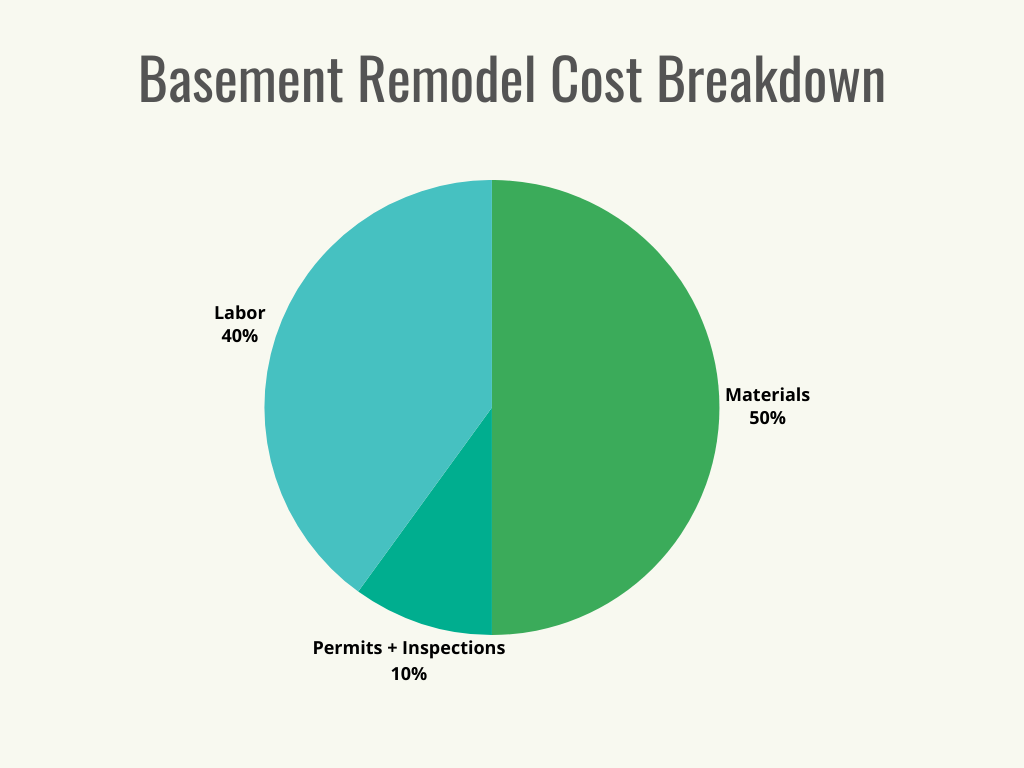
Additional Costs and Considerations
The average cost to finish a basement depends on multiple factors. For example, when calculating an accurate estimate, a contractor must determine whether repairs should be done first and whether moisture issues are a concern.
Foundation Repair
It’s a good idea for a homeowner to take care of any foundation damage before working on remodeling the basement to avoid future leaks or cracks in basement walls. On average, foundation repair cost can range from $2,164 to $7,793. Prices may go up significantly if the foundation needs to be leveled or reinforced.
Mold Removal
Basements, particularly unfinished basements, are notoriously damp. For this reason they can be prone to mold growth. Mold will need to be removed by one of the best mold removal companies (such as ServiceMaster Restore or ServPro) so that it does not cause health problems or structural damage after the remodel is complete. On average, mold remediation costs approximately $2,254.
Asbestos Removal
Homes built prior to the 1980s may have been built with materials that contain asbestos. In basements specifically, asbestos is commonly found in walls and floor tiles. When asbestos particles become airborne, they are a major health hazard as inhalation can cause asbestosis or mesothelioma. If there is any possibility that there is asbestos in the basement, it’s a good idea for a homeowner to get in touch with one of the best asbestos removal companies to have professional testing done before the project begins. If tests come back positive, homeowners can expect the cost of asbestos removal to be around $2,200.
Waterproofing
The difference between above-grade walls and basement walls is that basement walls directly contact the soil. This makes basements prone to moisture problems and leaking. Before finishing a basement, any moisture problems will need to be addressed by one of the best basement waterproofing companies (such as Basement Systems or B-Dry). On average, basement waterproofing costs an estimated $5 to $10 per square foot. This essential step can potentially save homeowners from dealing with flooded basement cleanup later on.
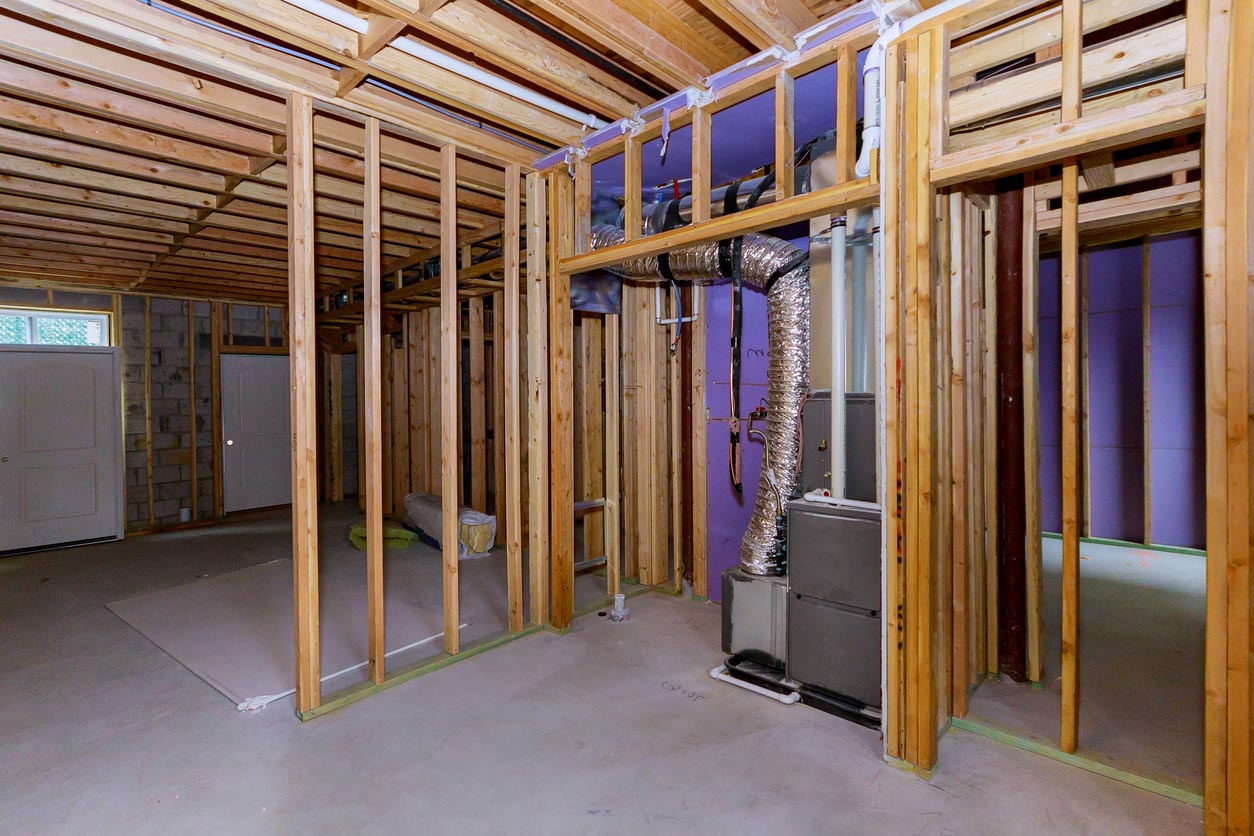
Basement Remodel Cost by Type of Project
If the basement is not already completely finished, some additional projects such as installing drywall or running electrical and plumbing may be necessary before the rest of the remodel can begin. Homeowners can create a planning guide for basement remodeling using the following costs as guidance.
| Project Type | Cost per Square Foot |
| Drywall | $1.50 to $3 |
| Electrical | $3 to $9 |
| Flooring | $3 to $20 |
| Framing | $4 to $10 |
| Insulation | $1.50 to $2.50 |
| Painting | $2.75 to $4.70 |
| Plumbing | $4.50 to $6 |
Drywall
Drywall can be installed after the walls have been framed and any insulation and wiring have been put in place. On average, the cost per square foot for drywall is $1.50 to $3.
Electrical
Unfinished basements may not be set up with electrical yet, or they may have old wiring that needs to be upgraded or replaced. Homeowners can expect to pay an electrician $3 to $9 per square foot for these services.
Flooring
It’s a good idea to choose flooring types that are resistant to moisture (such as tile) as basements have a tendency to be damp. The material that is chosen will affect the cost to install flooring, but in most cases prices range from $3 to $20 per square foot.
Framing
Before drywall can be installed, walls will need to be framed to divide the space into the desired number of rooms. This typically costs about $4 to $10 per square foot.
Insulation
Insulation improves the comfort and energy efficiency in a home’s living spaces. For basement insulation projects, the average cost is between $1.50 and $2.50 per square foot. It’s worth noting that basement walls that are situated mostly underground typically require a smaller amount of insulation.
Painting
Painting a basement can double as an aesthetic improvement and a layer of protection for the wall and ceiling materials. Having walls painted costs about $2.75 per square foot, but that cost increases to $4.70 per square foot if trim and ceilings are also included.
Plumbing
There are many reasons to run plumbing to a basement. If the space will be used as a family room or bedroom, it will need a bathroom. Some homeowners also choose to have their washer and dryer installed in the basement. Depending on the project, plumbing costs average at $4.50 to $6 per square foot.
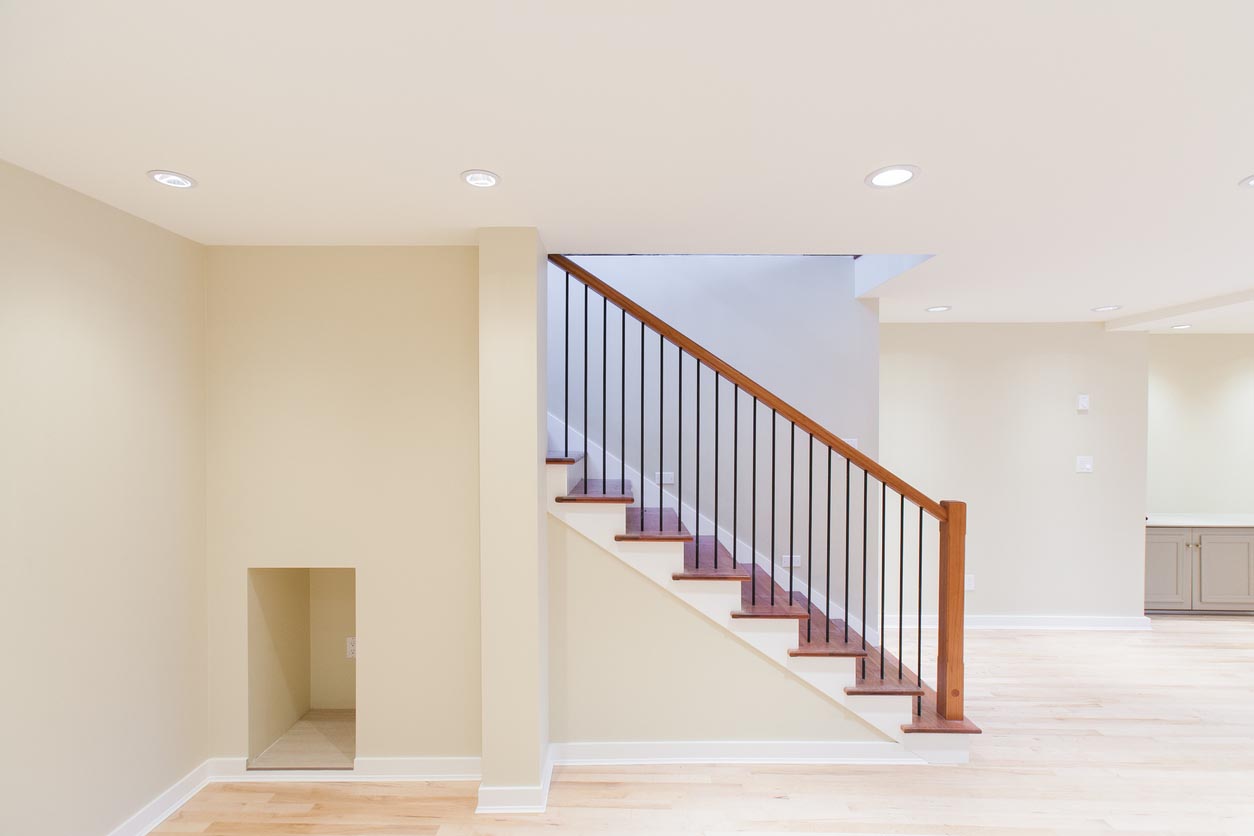
Benefits of a Basement Remodel
For many, the most significant benefit of finishing a basement is the increased family living space that can alleviate crowding on the main floors. Others are simply inspired by seeing basement remodel before-and-after photos online. A finished basement is also a selling point, and it makes a home more energy efficient as well.
Return on Investment
Most remodeling projects are expensive, and remodeling a basement is no exception. Remodeling Magazine estimates that a basement remodel’s return on investment (ROI) averages about 70 percent. So, remodel with the intent of enjoying the space, not just for resale purposes.
Additional Versatile Space
A basement remodeling project offers the homeowner a range of living solutions. A basement with a separate entrance can become a rental apartment or provide additional family space. The project can include adding new bedrooms, a playroom, a recreation area with a bathroom, or a craft room. The basement can be one of the most versatile spaces in the home.
Energy Efficiency
Finishing a basement often improves a home’s energy efficiency. During remodeling, the basement is often insulated—a project that typically costs around $1.50 and $2.50 per square foot, depending on the type of insulation. This reduces heat transfer through the main floor and, as a bonus, also reduces drafts. The result is a more energy-efficient house.
Mold Prevention
Unfinished basements are prone to moisture, which often leads to mold and mildew growth. Even when the basement is not being used, the existence of mold spores can affect the health of residents on the upper levels of the home. When a basement is remodeled, this typically begins with removing existing mold, waterproofing, and then implementing better ventilation, which will reduce the likelihood of a mold problem.
Income Potential
For those interested in making some passive income, opening up a basement to renters or turning it into an Airbnb can be a great option. Homeowners can convert their basement into a fully furnished living space with a bedroom, kitchenette, and bathroom to make it suitable for guests or short-term renters.
Basement Remodeling: DIY vs. Hiring a Professional
Homeowners can save a substantial amount of money by learning how to finish basement walls or tackling small jobs, such as painting and installing hardware. But the key is in knowing when to attempt DIY basement finishing and when it’s better left to the pros. A general rule is to call licensed professionals for projects involving electrical and plumbing, which often require permits. While plumbing is less dangerous than wiring, it requires working knowledge of making plumbing connections, and faulty plumbing can leak, leading to significant water damage down the road. Additionally, if there are signs that basement waterproofing or foundation repair are needed, such as cracks in walls or water leaking into the basement after heavy rain, it is absolutely essential that these problems be addressed by a professional.
It’s also worth noting that the more complex a basement remodeling project is, the more moving parts there are to manage. If homeowners find this intimidating, it may be worth considering hiring a general contractor to oversee the project. Basement remodel contractors take care of hiring subcontractors, sourcing materials, and making sure the project is completed smoothly at every step. It may even be more cost-effective to bring a contractor on board, as they know how to finish a basement efficiently with a reduced likelihood of expensive mistakes.
How to Save Money on Basement Remodel Cost
When DIY-ing some or all of a basement remodeling project isn’t feasible, homeowners may still be able to save some money. They’ll want to keep in mind that many costs are negotiable, and by compromising on materials, a basement remodel doesn’t have to break the bank. The following tips can save money without sacrificing overall quality or the ability to enjoy the basement.
- Do your homework. Visit trade shows, go to open houses, and browse through home design magazines to see how other homeowners have finished their basements. The more ideas available to draw from, the easier it is to select budget-friendly designs and still get the desired look.
- Don’t make changes once the project starts. Contractors often charge extra for change orders because they have to alter their plans, which takes more time. Know what you want, and stick to it.
- Choose materials carefully. Avoid using materials that exceed the quality of the materials used on the above-grade floors. For example, don’t choose quartz countertops for a wet bar in the basement if the upstairs kitchen has laminate countertops. Not only will this save money, but it will create a cohesive look through the home.
- Consider an open basement plan. Separating the basement living space into multiple rooms means building walls and running additional wiring, which adds substantially to the final tally.
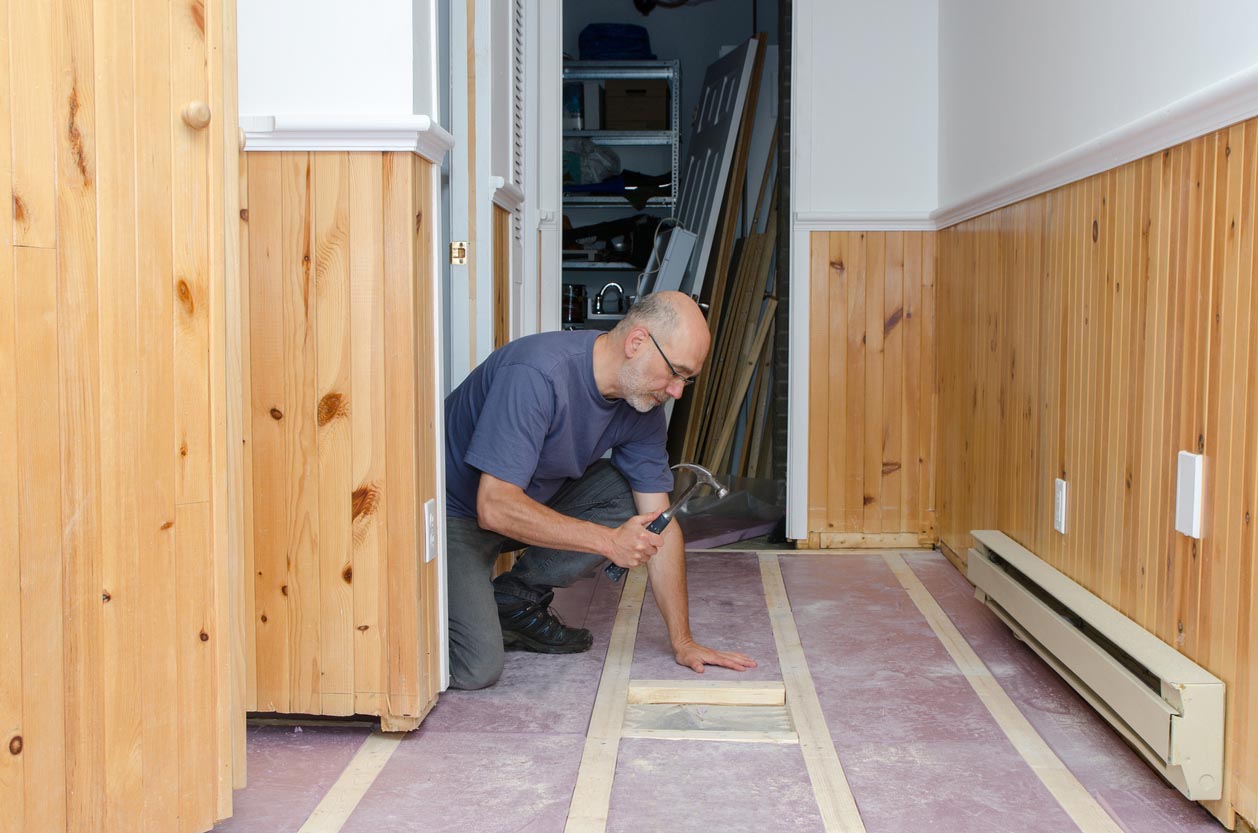
Basement Remodel Financing Options
The cost to remodel a basement is not insignificant, and not all homeowners will be able to pay for this project out of pocket. Fortunately, there are plenty of financing options to choose from. Homeowners will want to carefully consider what kind of loan or financing best fits their needs, project, and budget.
- Home equity loan. This kind of loan allows homeowners to tap into the equity they have built up in their home to use as collateral. Homeowners can start by looking into the best home equity loans from lenders such as U.S. Bank and Flagstar Bank.
- Home equity line of credit. The best HELOC lenders give homeowners flexibility by allowing them to borrow against their home’s equity as needed rather than taking a lump-sum payment. This type of loan can also be used at the borrower’s discretion, so they can use funds for a variety of expenses in addition to financing a particular project.
- Home improvement loan. The best home improvement loans are paid out with the expectation that the borrower will use the money to pay for a specific project that will improve their home. It can cover the cost of materials, labor, tools, permits, and more. Borrowers will need to start paying back the loan immediately in monthly installments.
- Cash-out refinance. A cash-out refinance allows homeowners to replace their existing mortgage, taking out the equity they have already built up as a lump sum. The new mortgage may be a different type, have a different loan length, or have a reduced interest rate. Some of the best mortgage refinance companies homeowners may want to consider include PNC Bank and Caliber Home Loans.
Questions to Ask About Basement Remodeling
The oft-recommended advice is to get bids from a minimum of three contractors before choosing one to do the remodeling. While that’s sage advice, ask the following questions to ensure the best contractor is selected for the job.
- How much does it cost to finish a basement?
- How much experience do you have with this kind of project?
- Can I see some examples of your previous work?
- Will the work require additional subcontractors?
- Can I get a cost breakdown for a variety of materials?
- Approximately how long will this job take?
- Will you pull the necessary permits?
- When will payments be due?
- May I have a firm bid—not just an estimate?
- What additional costs could arise during the project?
- What kind of warranty do you offer?
FAQs
Basement remodeling and renovating are expensive, but they’re investments in the home when done tastefully and with good workmanship. For those thinking about a basement remodeling project, some questions are likely.
Q. How much does it cost to renovate a 1,000-square-foot basement?
On average, basement remodeling costs $30 to $75 per square foot, so the cost to remodel a 1,000-square-foot basement would range from $30,000 to $75,000, depending on the material and fixture costs.
Q. How much does it cost to renovate a 1,200-square-foot basement?
At an average of $30 to $75 per square foot, remodeling a 1,200-square-foot basement would cost between $36,000 and $90,000.
Q. How do I budget for a basement remodel?
Do plenty of research before starting to ensure you’re getting what you want at a price you can afford. Because a basement remodel is an investment in the home, your lender may give you a home equity loan to pay for the project, and you can pay the loan back in installments.
Q. What is the resale value of a house with a finished basement?
The resale value of a house depends on many factors. In general, homeowners can recoup 70 percent of the cost of a basement remodel when they sell. For example, if the current house is valued at $250,000 and the homeowner spends $50,000 on the basement remodel, it would potentially increase the house’s value by 70 percent of $50,000, which is $35,000. That would boost the home’s value—when the project is complete—to $285,000.
Q. What is the most expensive part of finishing a basement?
Adding bathrooms, home theaters, and wet bars are among the most expensive basement remodeling projects. Bathrooms cost an average of $6,600 to $16,500, and wet bars cost about $8,000 on average. Home theaters cost about $12,000.
Sources: Angi, HomeAdvisor, Breyer Construction and Landscape
